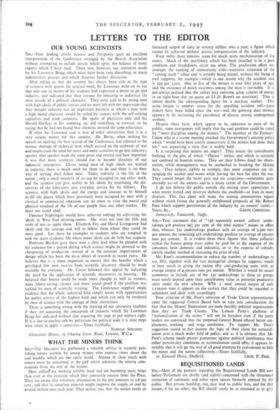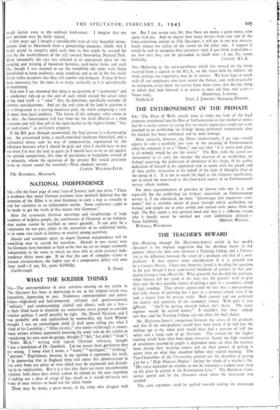REQUISITIONED LANDS
Stn,—Most of the protests regarding the Requisitioned Lands Bill now before Parliament are chiefly (and rightly) concerned with the threatened extinction of commons and other open spaces formerly enjoyed by the public. But private hardship, too, may lead to public loss, and for that reason, if for no other, the Bill should surely be so amended as to give rough justice even to the ordinary land-owner. I imagine that my own position may be fairly typical.
A few years ago I bought a considerable tract of very beautiful moun- tainous land in Merioneth from a prospecting company, chiefly that I might guard its integrity until such time as that might be assured for ever by the establishment of the still awaited Snowdonia National Park. Quite reasonably the area was selected as an appropriate place for the camping and training oT mountain batteries, pack-horse trains and such like, though I was alarmed to see the wonderful old stone walls being demolished to form roadways, mule standings and so on in the few really fertile valley meadows that they still cumber and disfigure. It may all have been necessary, but the mess is as tragic scenically as it is agriculturally disheartening.
And now I am informed that there is no question of " restoration " and a valedictory tidy-up as the cost of such would exceed the actual value of the land itself—a " value " that, by definition, specifically excludes all amenity considerations. And yet the real value of the land in question is as a foreground to a soaring mountain peak, the whole composing a view of more than local celebrity. The future of this unhappy valley seems to be this: the Government will buy from me the fields affected at a 1939 valuation and will then sell in the open market to the highest bidder " free of restrictions " as ex-Crown property.
If the Bill goes through unamended, the final picture is a discouraging one. An eviscerated farm, a much-cherished landscape blemished, and a substantial minus sum by way of compensation, represented by the difference between what I should be paid and what I should have to pay out were I to buy the land in again (as I should have to try to do) against the outside competition, this time of speculators in bungalows instead of in minerals, whom the operation of the present Bill would positively invite to cluster round the waterfall.—Your obedient servant,
CLOUGH WILLIAMS-ELLIS.
Reis Brondanw, Merioneth.



























 Previous page
Previous page